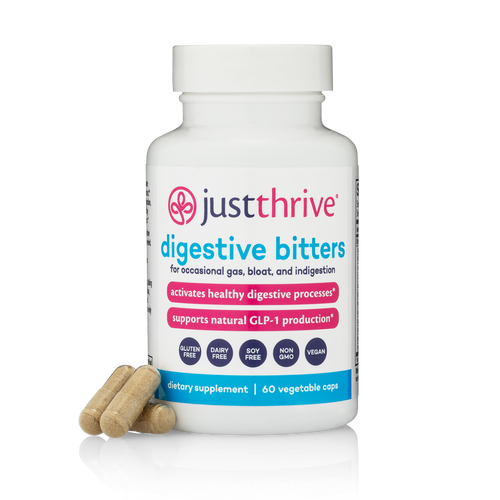Has your intimate time been suffering lately?
Falling asleep while your partner brushes their teeth…
Racing thoughts making it impossible to be present or concentrate on what’s going on “down there”...
Or are you just simply “not in the mood?”
Some of this is normal. After all, it’s only natural for your libido to ebb and flow on occasion.
But if you find yourself struggling with lack of desire more often than not, it might be worth taking a look at something most people never even equate with their sexual health.
Surprising as it may seem, addressing this one thing could be the key to restoring your desire and rejuvenating your intimate connection.
So what’s this one thing that could be the key that unlocks your mojo kingdom?
Meet Your Microbiome
Before we explore the relationship between your microbiome and intimacy, let’s take a closer look at what your microbiome is and how it impacts you.
Your body is teeming with microorganisms, including bacteria, viruses, fungi, and archaea. Mostly unseen and unfelt, these live on your skin, in your mouth, nose, ears, and in your gut.
Yes, your gut!
In fact, the vast majority of the microorganisms that influence your health live in your digestive system. Here, we pay particular attention to bacteria.

Your gut is filled with two different kinds of bacteria.
- Beneficial (“good”) bacteria
- Pathogenic (“bad”) bacteria
Because your gut has a limited amount of space, the good bacteria and bad bacteria are forced to compete for “real estate.”
Ideally, the colonies of beneficial bacteria will flourish and grow, crowding out the pathogenic bacteria and resulting in a happy, well-balanced gut.
Unfortunately, the opposite is much more often the case.
For most people, the bad bacteria is stronger in both quantity and quality. As a result, your gut microbiome is unbalanced—a condition known as dysbiosis.
Dysbiosis is incredibly common. In fact, there’s a good chance that you have dysbiosis right now… you just haven’t realized it!
And you’ll feel its negative effects in all areas of your health: physical, emotional, mental, and sexual health.

How to Tell If Your Gut Bacteria Is Affecting Your Sex Life
Your sexual excellence is an inside job, and everything from job stress to illness can impact your libido.
If it’s due to your microbiome, though, it won’t be just your sex life that feels the negative impact. When your gut bacteria is unbalanced, you’ll also see clear indications in your general well-being.
Looking at the bigger picture—your overall health—can help you determine whether you have a bacterial imbalance that could be affecting your sex life.
Here are some of the signs to look for.
- Acid reflux and/or heartburn
- Anxiety
- Bloating and/or gas
- Chronic fatigue
- Cognitive and mood issues
- Digestive issues
- Food intolerances or allergies
- Skin issues
- Sore joints
- Stomach cramps
- Trouble urinating
- Vaginal or rectal problems or itching
Any of the symptoms above, combined with a less than stellar sex drive, can indicate an imbalance in your gut microbiome.
But what are some of the specific ways your gut and microbiome issues can disrupt intimacy?
How An Unhealthy Microbiome Affects Intimacy
Let’s take a closer look at some of the ways a bacterial imbalance can negatively affect your sex life.
Libido
Did you think your gut bacteria would only impact your digestion? Think again!
The bacteria in your gut microbiome is one of the biggest factors that affects your libido, or sex drive.
Your gut is responsible for the production of serotonin, “the happiness hormone.” In fact, over 90% of the serotonin in your body is found in your gut—more specifically, in the cells that line your digestive tract.[1]
But serotonin does more than just make you happy. It also controls your libido.
- If your serotonin levels are too low, you’re more likely to be unhappy, which lowers your libido. And when you’re feeling depressed, the only thing you’ll likely want to do in bed is sleep.[2]
- However, if your serotonin levels are too high, it can interfere with the signals between your brain and your body, including your sex organs. This can make it more difficult for your body to experience sexual arousal.
Having the optimal serotonin level is crucial to achieving and maintaining a strong, healthy libido.

Performance Anxiety
It’s not as easy to get “in the mood” when you're worried about what your body might decide to do, mid-encounter.
Just picture it: you’re having an amazing evening with your partner. Everything is going great and your chemistry is off the charts. Things heat up, but just at the most crucial moment, your tummy needs relief… and fast!
Sadly, that’s the reality for people whose microbiome is thrown off by pathogenic bacteria.
Digestive issues, from diarrhea to gas to IBS (Irritable Bowel Syndrome) can strike at any time. And being nervous about these issues can aggravate them!
It’s a challenging cycle: your GI issues create or heighten anxiety, and anxiety worsens your GI issues.
Energy
Eyelids closing as soon as your head hits the pillow? Your gut might be to blame!
One of the many things that your gut does is break down foods and absorb nutrients, which it converts to energy at a cellular level.
So when your gut health is compromised, your body won’t be getting the energy it needs, regardless of how healthy your diet is.
Plus, an imbalanced microbiome negatively impacts your sleep. You’ll have difficulty falling asleep, staying asleep, and achieving quality sleep.
The result? You’re tired, sluggish, and feel like you have zero energy for anything—including intimacy.

Support Your Gut For a Thriving Sex Life
Now that you know that your sexual issues could be caused by your microbiome, there’s only one thing left to do.
Get your microbiome in tip-top shape, so you can reclaim the juicy and connected sex life we all crave.
Here are some ways you can give your gut the TLC it needs to thrive.
Eat Healthy Foods
Your nutritional habits play a key role in your gut health.
Probiotic-friendly foods will add to the numbers of the beneficial bacteria in your gut. Thriving colonies of the good bacteria crowd out the bad and help bring balance to your gut as well as to your intimacy.
Probiotic foods are usually fermented and can be found easily at most grocery stores.
Here are some of the most effective probiotic foods and drinks.
- Kefir
- Kimchi
- Miso
- Pickles
- Sauerkraut
- Soft cheeses (some)
- Sourdough bread
- Tempeh
- Yogurt (with probiotics)
At the same time, try to reduce your sugar intake. Research shows that diets high in sugar have a negative impact on your gut health.[3]

Exercise Moderately
Regular, moderate exercise can also improve your gut health by increasing both the numbers and the quality of beneficial bacteria.[4]
But what exactly constitutes moderate exercise?
Moderate exercise is exercise that allows you to hold a conversation while still raising your heart rate and breaking a sweat. Ideally, you should aim for 150 minutes per day, spread out throughout your week. [5]
Here are some examples of moderate exercise. Some of these, such as walking and swimming, can be done at different levels, so make sure you’re going at a pace that works well for you.
- Cycling (on flat terrain)
- Dancing
- Heavy cleaning
- Swimming
- Walking
- Water aerobics
- Yoga
You’re more likely to stick to exercise if you enjoy it. If you hate swimming, try dancing. If you like to stretch, check out a yoga class.
The most important thing is to move your body!
Improve Your Sleep
Good sleep and good gut health are more closely connected than you might think.
Having a balanced microbiome helps you sleep better and more deeply. At the same time, getting a good amount of quality sleep is crucial to maintaining your gut microbiome health.
Most adults need a good seven hours of sleep per night.[6] Anything less can affect your gut health.
Practicing good sleep habits can help get your gut issues and sex drive back on track. Here are some tips to improve your sleep:
- Eliminate electronics near bedtime.
- Remove electronics from the bedroom.
- Keep your bedroom cool and dark.
- Create a relaxing bedtime routine.
- Avoid caffeinated beverages late in the day.
Take a Probiotic Supplement
A diet high in probiotics can help support both your gut balance and your sex drive!
But fermented foods, with their unique scent and flavor, aren’t appealing to everyone. And unfortunately, studies show that most of the time, the probiotics in foods and drinks don’t make it to your gut alive (meaning their impact is slim).
For these reasons, we highly recommend a probiotic supplement, like Just Thrive Probiotic.
Unlike most brands on the market, Just Thrive is clinically proven to navigate through your body’s harsh stomach acids, bile, and more, arriving at your gut 100% alive and ready to get to work!
And if you don’t like taking pills, you can break open the probiotic capsule and sprinkle its contents into your favorite delicious, nutritious recipe (or try a delicious gummy!).
Ignite Your Sex Life with a Healthy Microbiome
Scientists have known for years that your gut health affects your overall well-being: your emotional, physical, and mental health.
But now there’s increasing evidence of the role it plays in your sexual health, too.
So if you’ve noticed a declining libido or a lackluster love life, the culprit might be your gut.
Luckily, with a few dietary and lifestyle changes, and the addition of Just Thrive Probiotic, you can balance your microbiome and start enjoying a robust, satisfying sex life in no time.
>> Support your sexual health with Just Thrive Probiotic.
And in case you didn’t know, all Just Thrive purchases are COMPLETELY covered by our Bottom of the Bottle, 100% money back guarantee.
That means you can give Just Thrive Probiotic a try, and if for some reason you don’t see a difference, simply ask for a full product refund at any time... Whether it’s been 2 weeks, 2 months, or 2 years… Even if the bottle is empty!
Sources
- Yano, J. M., Yu, K., Donaldson, G. P., Shastri, G. G., Ann, P., Ma, L., Nagler, C. R., Ismagilov, R. F., Mazmanian, S. K., & Hsiao, E. Y. (2015). Indigenous bacteria from the gut microbiota regulate host serotonin biosynthesis. Cell, 161(2), 264–276. https://doi.org/10.1016/j.cell.2015.02.047
- Cleveland Clinic. Depression and Sex. Cleveland Clinic. Last reviewed December 11, 2020. Accessed April 26, 2023. Available from: https://my.clevelandclinic.org/health/diseases/9296-sexual-problems-and-depression-
- Columbia University Irving Medical Center. Sugar Disrupts Microbiome, Eliminates Protection Against Obesity and Diabetes. Published August 29, 2022. Accessed April 26, 2023. Available from: https://www.cuimc.columbia.edu/news/sugar-disrupts-microbiome-eliminates-protection-against-obesity-and-diabetes
- Monda V, Villano I, Messina A, et al. Exercise Modifies the Gut Microbiota with Positive Health Effects. Oxid Med Cell Longev. 2017;2017:3831972. doi:10.1155/2017/3831972
- Centers for Disease Control and Prevention. How much physical activity do adults need? Last Reviewed: June 2, 2022. Accessed April 26, 2023. https://www.cdc.gov/physicalactivity/basics/adults/index.htm
- Centers for Disease Control and Prevention. How Much Sleep Do I Need? Last Reviewed: September 14, 2022. Accessed April 26, 2023. https://www.cdc.gov/sleep/about_sleep/how_much_sleep.html














